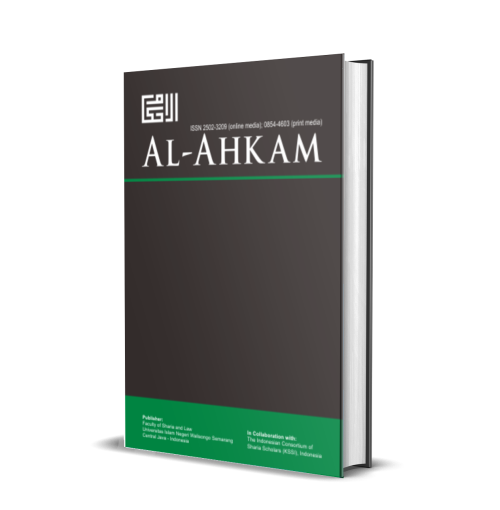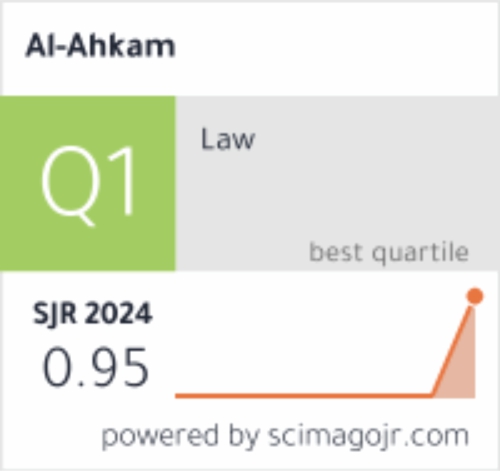Hate Speech During the Caliphate of ‘Alī ibn Abī Ṭālib and Its Relevance to Regulations in Indonesia: The Study of the Islamic Law History
DOI:
https://doi.org/10.21580/ahkam.2021.31.2.8956Keywords:
hate speech, ‘Alī ibn Abī Ṭālib, ta’zīr, the history of Islamic lawAbstract
This paper aims to describe the process of overcoming hate speech crimes during the caliphate of 'Alī ibn Abī Ṭālib in the perspective of the history of Islamic law. The important question to be answered in this paper is how did the caliph 'Alī ibn Abī Ṭālib contribute to handling the problem of hate speech? This paper finds three essential things. First, the death of Caliph 'Uthmān became the cause of the emergence of various slander. The main perpetrators were the Sabā’iyyah, Khawarij, and Shia groups. The form of slander is in the form of hate speech, such as insulting, defaming, inciting, spreading hoaxes which are violations of human rights and have discriminated against certain entities and individuals. Second, the policy of overcoming hate speech is pursued by a criminal and social law approach. Third, the relevance between ‘Alī ibn Abī Ṭālib's policy and existing regulations in Indonesia lies in the form of actions, punishments, and protection of human rights from discrimination.
Downloads
References
Afandi, Irfan. ‘Hoax dalam Sejarah Islam Awal (Kajian Kritis tentang QS. An-Nur: 11-12)’. Ar-Risalah: Media Keislaman, Pendidikan dan Hukum Islam 16, no. 1 (3 April 2018): 145–61. http://ejournal.iaiibrahimy.ac.id/index.php/arrisalah/article/view/150.
Alzahrani, Saeed Mohammed. ‘Hate Speech from the Traditional Islamic Perspective’. The Indiana University, 2017. https://doi.org/10.2/JQUERY.MIN.JS.
Arief, Barda Nawawi. Bungan Rampai Kebijakan Hukum Pidana. Ke 5. Jakarta: Kencana, 2014.
Asphianto, Aan. ‘Ujaran Kebencian dalam Sudut Pandang Hukum Positif dan Islam’. Al-Risalah 17, no. 1 (17 January 2018). https://doi.org/10.30631/AL-RISALAH.V17I01.3.
Al-‘Awd, Sulaymān ibn Fahd. ‘Abdullāh bin Sabā’ wa Atharuh fī Aḥdāth al-Fitnah fī Ṣadr al-Islām. Dār al-Ṭaybah, 1412. https://books-library.net/files/elebda3.net-wq-5121.pdf.
‘Awdah, ‘Abd al-Qāḍīr. Al-Tashrī’ al-Jinā’ī al-Islāmī Muqāranan bi al-Qānūn al-Waḍ’ī. Beirut: Mu’assasah al-Risālah, 2001.
Al-‘Ayyāshī, Muḥammad ibn Mas’ūd. Al-Tafsīr al-’Ayyāshī. Teheran: Maktabah al-Ilmiyah al-Islāmiyah, n.d.
Al-Balādhrī, Aḥmad ibn Yaḥyā ibn Jābir. Jumal min Insāb al-Ishrāf. Beirut: Mu’assasah al-I’lāmī, 1973.
Al-Bayhaqī, Abū Bakr Aḥmad ibn Ḥusayn ibn ‘Alī. Al-Sunan al-Kubrā. Beirut: Mu’assasah al-Ṭibā’ah wa al-Taṣwīr, n.d.
Al-Bukhārī, Muḥammad Ibn Ismā’īl. Ṣaḥīḥ al-Bukhārī. Riyad: Bayt al-Afkār al-Dawliyyah li al-Nashr wa al-Tawzī’, 1997.
Brison, Susan J. ‘The Autonomy Defense of Free Speech’. Ethics 108, no. 2 (January 1998): 312–39. https://doi.org/10.1086/233807/0.
Ḍāhar, Muḥammad Fu’ād. Aqḍiyyah al-Khalīfah al-Rāshid ‘Alī ibn Abī Ṭālib, Dirāsah Ta’ṣīliyah Taṭbīqiyah li Manhaj ‘Alī fī Uṣūl al-Fiqh. 1st ed. Kuwait: Mabarrah al-Āl wa al-Aṣḥāb, 2015. https://d1.islamhouse.com/data/ar/ih_books/single_01/ar_Aqdit_’Alī_ibn_Abu_T’Alīb.pdf.
Al-Dihlawī, Shah W’Alīyullāh. Ḥujjah al-Bālighah. Riyad: Maktabah al-Kawthar, 1999.
Fisch, William B. ‘Hate Speech in the Constitutional Law of the United States’. The American Journal of Comparative Law 50 (2002): 492. https://doi.org/10.2307/840886.
Hadi, Sutrisno. Metodologi Research. Yogyakarta: Fakultas Psikologi Universitas Gadjah Mada, 1990.
Al-Ḥumaydī, ‘Abd al-‘Azīz ibn ‘Abd. Al-Khulafā’ al-Rāshidūn Mawāqif wa ’Ibar. Iskandariyah: Dār al-Da’wah, 2005. https://down.ketabpedia.com/files/bkb/bkb-hi03517-ketabpedia.com.pdf.
Kamali, Mohammad Hashim. ‘Ethical Limits on Freedom of Expression with Special Reference to Islam’. Cile Journal, 2014, 42–62. https://www.cilecenter.org/sites/default/files/pdfs/Recommended-Articles-English-Ethical-Limits-on-Freedom-of-Expression.pdf.
Marwa, Atikah, and Muhammad Fadhlan. ‘Ujaran Kebencian di Media Sosial Menurut Perspektif Islam’. Al-Afkar Journal for Islamic Studies 4, no. 1 (4 March 2021): 1–14. https://al-afkar.com/index.php/Afkar_Journal/article/view/140.
Moeljatno. KUHP Kitab Undang-Undang Hukum Pidana. Jakarta: Bumi Aksara, 2006.
Al-Mun’im, ‘Abdullāh ibn Sulaymān ibn ‘Alī al-‘Abd. ‘Fiqh Amīr al-Mu’minīn ‘Alī Ibn Abī Ṭālib fī al-Ḥudūd wa al-Jināyāt wa Athruh fī Tashrī al-Jinā’ī al-Islāmī’. Jāmi’ah Nāyif al-‘Arabiyah li al-‘Ulūm al-Umniyah , 2004. https://ia903400.us.archive.org/30/items/fiqh07001/fiqh07713.pdf.
Nasution, Johan. Metode Penelitian Ilmu Hukum. Bandung: Mandar Maju, 2008.
Al-Rāḍī, Sharīf. Nahju al-Balāghah. Beirut: Dār al-Ma‘rifah, n.d.
Radhi, Syekh Syarif. Nahjul Balaghah, Puncak Kearifan Sepanjang Masa. Yogyakarta: Diva Press, 2020.
Rokhmad, Abu. Uṣūl Fiqh Metodologi Ijtihad Hukum Islam. Semarang: Varos Mitra Utama, 2002.
Al-Sa’d, Ghassān. Huqūq al-Insān ‘ind al-Imām ‘Alī ibn Abī Ṭālib ’Alayh al-Salām Ru’yah ’Ilmiyah. Baghdad, 2008. http://www.alnoor.se/article.asp?id=58783.
Al-Ṣamad, Ḥammad Muḥammad ‘Abd. Niẓām Al-Ḥukm fī ‘ahd al-Khulafā’ al-Rāshidīn. Beirut: Mu’assasah al-Jāmi’iyyah li al-Dirāsāt wa al-Nashr wa al-Tawzī’, 1994.
Al-Shallabi, ‘Alī Muhammad. Biografi ‘Alī ibn Abī Ṭālib. Jakarta: Ummul Qura, 2017.
Shaybah, Ibn Abī. Al-Muṣannaf, 1986.
Al-Shirbīnī, Muḥammad al-Khaṭīb. Mughnī al-Muḥtāj. Beirut: Dār Al-Kutub Al-‘Ilmiyyah, 2000.
Soekanto, Soerjono, and Sri Mamudji. Penelitian Hukum Normatif Suatu Tinjauan Singkat. Jakarta: RajaGrafindo Persada, 2011.
Sofian, Yayan. Tarikh Tasyri’ Sejarah Pembentukan Hukum Islam. Jakarta: Rajaw’Alī Press, 2018.
Al-Ṭabarī, Muḥammad ibn Jarīr. Tārīkh al-Umam wa al-Mulūk. Beirut: Dār al-Fikr, 1987.
Wardani, Yani’ah, and Ekawati Ekawati. ‘Ujaran Kebencian Berbasis Agama: Kajian Persepsi, Respon, dan Dampaknya di Masyarakat’. Buletin Al-Turas 26, no. 1 (10 February 2020): 153–71. https://doi.org/10.15408/BAT.V26I1.13698.
Al-Wāsiṭī, ‘Alī ibn Muḥammad al-Layth. ‘Uyūn al-Ḥukm wa al-Mawā’iẓ. Dār al-Ḥadīth, 2000. https://hz.turathalanbiaa.com/public/3103.pdf.
Al-Zuhaylī, Wahbah. Al-Fiqh al-Islāmī wa Adillatuh. 2nd ed. Damaskus: Dār al-Fikr al-’Arabī, 1985.
Downloads
Published
How to Cite
Issue
Section
License
By submitting an article to the journal, the author(s) agree to transfer the published article's copyright to the journal, which will act as the publisher. This means the journal will have the right to publish the article in various forms, including reprints. The journal will maintain the publishing rights to the published articles.
In line with the license, authors and third parties (readers, researchers, and others) are allowed to share and adapt the material. In addition, the material must be given appropriate credit, provided with a link to the license, and indicated if changes were made. If authors remix, transform or build upon the material, authors must distribute their contributions under the same license as the original.




